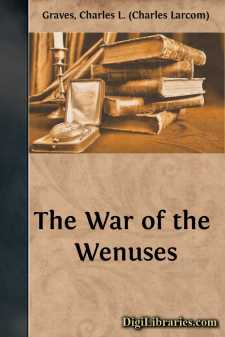Categories
- Antiques & Collectibles 13
- Architecture 36
- Art 48
- Bibles 22
- Biography & Autobiography 813
- Body, Mind & Spirit 142
- Business & Economics 28
- Children's Books 15
- Children's Fiction 12
- Computers 4
- Cooking 94
- Crafts & Hobbies 4
- Drama 346
- Education 46
- Family & Relationships 57
- Fiction 11828
- Games 19
- Gardening 17
- Health & Fitness 34
- History 1377
- House & Home 1
- Humor 147
- Juvenile Fiction 1873
- Juvenile Nonfiction 202
- Language Arts & Disciplines 88
- Law 16
- Literary Collections 686
- Literary Criticism 179
- Mathematics 13
- Medical 41
- Music 40
- Nature 179
- Non-Classifiable 1768
- Performing Arts 7
- Periodicals 1453
- Philosophy 64
- Photography 2
- Poetry 896
- Political Science 203
- Psychology 42
- Reference 154
- Religion 513
- Science 126
- Self-Help 84
- Social Science 81
- Sports & Recreation 34
- Study Aids 3
- Technology & Engineering 59
- Transportation 23
- Travel 463
- True Crime 29
Charles L. (Charles Larcom) Graves
Charles Larcom Graves (1856–1944) was an English journalist, biographer, and humorist known for his sharp wit and satirical writing. He contributed regularly to "Punch," a prominent British humor magazine, and authored several books, including "Mr. Punch's History of Modern England" and "The Green Bag." Graves also wrote biographies, such as "Life of Sir George Darwin," showcasing his skill in both light-hearted and serious genres. His works often reflected his keen observation of social trends and political satire in late Victorian and Edwardian England.
Author's Books:
Sort by:
PROLOGUE Though a lover of peace, Mr. Punch from his earliest days has not been unfamiliar with war. He was born during the Afghan campaign; in his youth England fought side by side with the French in the Crimea; he saw the old Queen bestow the first Victoria Crosses in 1857; he was moved and stirred by the horrors and heroisms of the Indian Mutiny. A little later on, when our relations with France...
more...
I. "JUST BEFORE THE BATTLE, MOTHER." No one would have believed in the first years of the twentieth century that men and modistes on this planet were being watched by intelligences greater than woman's and yet as ambitious as her own. With infinite complacency maids and matrons went to and fro over London, serene in the assurance of their empire over man. It is possible that the mysticetus...
more...



